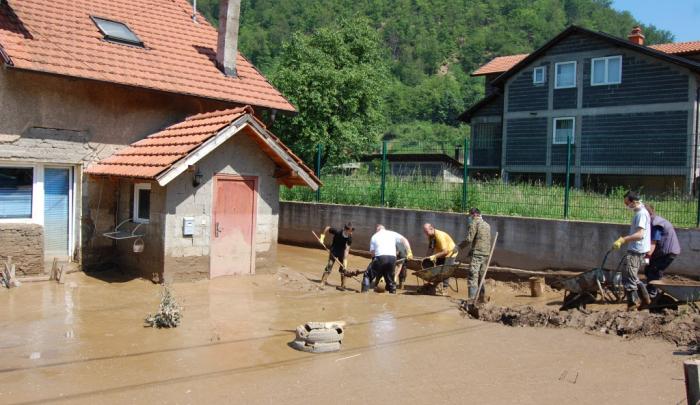
SARAJEVO, (May 28, 2014) –“Now that the floodwaters have receded, we are seeing—for the first time in many places—the true extent of the damages caused by the record-breaking floods and the work that needs to be done,” said Sarah Bearup, Director of World Vision’s programmes in Bosnia and Herzegovina.
The rains and resulting floods are the worst Bosnia and Herzegovina has experienced in more than 100 years. Nearly 1.5 million people – almost half the country’s population – is affected. While official statistics vary, based in part on the complex governing structure of Bosnia and Herzegovina, international organizations estimate that around nearly 40,000 people have been forced from their homes because of high waters or the effects of the more than 3,000 landslides that have occurred; 15 villages continue to be completely cut off from the rest of the country and are accessible only by air.
World Vision, who has been working in Bosnia and Herzegovina since 1994 saw five of the six areas where it normally operates heavily impacted.
Before the rains had even stopped, World Vision began responding, providing food and non-food items to families in need within the first 24 hours.
Today, nearly two weeks after the flooding started, World Vision is shifting its focus from life-saving to recovery-focused interventions.
Now that the floodwaters have receded, other threats; like uncovered, unexploded landmines and the potential of disease from decaying animal carcases and contaminated water are on the rise.
World Vision is providing families with materials they need to clean-up and re-build, including materials to disinfect and purify water. Additionally, the organization, together with UNICEF and OSCE is also preparing a video that will be played on national television to help educate children about the risks they face after floods and help them act accordingly.
Providing psychological as well as physical support
“With many schools closed because of the damages caused by the floods, it is important for children to have a safe place to spend their time, where they can learn and return to a sense of routine,” added Bearup, noting that 10 Child Friendly Spaces are being established and are expected to serve children throughout the country.
World Vision has been working in Bosnia and Herzegovina for 20 years and is committed to helping children, their families and the communities where they live recover so that they can continue to grow and be able to live life in all its fullness with the hope of a brighter future.
– END –
About World Vision:
World Vision is a Christian humanitarian organization conducting relief, development, and advocacy activities in its work with children, families, and their communities in nearly 100 countries to help them reach their full potential by tackling the causes of poverty and injustice. World Vision serves all people regardless of religion, race, ethnicity, or gender. For more information, please visit www.WorldVision.org/media-center/ or on Twitter @WorldVisionUSA.
Highlights
- 1.5 million people, nearly half of country’s population, impacted
- Uncovered, unexploded landmines remain a threat
- World Vision providing food assistance, long-term recovery help